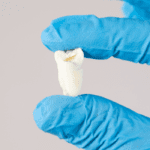Gum disease, or periodontal disease, is a dental ailment commonly experienced by adults.
Around 50 percent of adults over 30 suffer from one form of gum disease. Along with tooth decay, gum disease is one of the two most significant threats to dental health.
Periodontal disease is characterized by an infection in your gum tissues, which results from hardened plaque caused by poor oral hygiene and inconsistent cleaning habits. Initially, this disease damages the soft tissue. Once left untreated, it can destroy the bone that supports the teeth.
During its early stages, known as gingivitis, you can experience swollen, bleeding gums. From there, infections can spread and affect the bone that supports the teeth, which is why in its advanced stages – known as periodontitis – gum disease is accompanied by severe health complications. Among these include receding gums, bone loss, loose teeth, and eventually, tooth loss.
Not all cases of gum disease are as serious as others. In fact, this disease is largely preventable. With consistent brushing and flossing as well as getting regular dental checkups, you’ll reduce your chances of developing the disease.
What Are the Stages of Gum Disease?
Gum disease is only reversible if diagnosed in its earliest stage: gingivitis. Schedule a dental checkup with your dentist today if your gums feel tender, appear swollen and red, and bleed when you brush.
Here are the three stages of periodontal disease:
Stage 1: Gingivitis
Your brushing and flossing habits may sometimes fall short of completely removing plaque at the gum line, which is why it’s necessary to have a regular dental checkup every six months to have your teeth and gums checked.
Unremoved plaque hardens and causes gingivitis — the earliest stage of gum disease. This stage is marked by tender, bleeding, and swollen gums. Given that hardened plaque can no longer be removed by toothbrushes alone, a dentist uses specialized cleaning tools to prevent its progression.
Stage 2: Periodontitis
If gingivitis is left untreated, the hardened plaque spreads and builds up under the gum line, leading to a condition known as periodontitis. In this stage, bacteria from hardened plaque produces toxins that irritate your gums and stimulate a chronic inflammatory response wherein the tissues and bone that support the teeth break down. Also, bacteria start to enter your bloodstream and stress the immune system.
Periodontitis mainly attacks your gums and teeth. In this stage, gums separate from your teeth and form spaces in between, known as pockets. These become infected, causing the pockets to deepen and destroying soft tissue and supporting bones. At this point, the destructive process is accompanied by mild symptoms.
The treatment options for this stage include root planing and scaling, which deep-clean the area and remove bacteria deposits under the gum line.
Stage 3: Advanced Periodontitis
This is the final stage of gum disease, and it occurs when the infection reaches the depths of your teeth and gums. At this point, gum disease is painful, and around 50 to 90 percent bone loss occurs. Some signs present at this stage include swollen, red gums, sensitive teeth, oozing, loose teeth, painful chewing, severe halitosis, and gum pockets over seven millimeters deep.
In the worst cases, gingival recession, teeth spacing, teeth loss, and teeth sensitivity are present, leading to severe health issues as more bacteria are released into the bloodstream.
What Causes Gum Disease?
Plaque is the leading cause of periodontal disease. In addition, the most common factors that contribute to gum disease include:
Hormonal Changes
Hormonal changes in pregnancy, puberty, monthly menstruation, and menopause cause gums to be more sensitive, leading to the development of gingivitis. An increase in hormones makes your gum’s blood vessels more vulnerable to bacteria and chemicals. During puberty, the prevalence of gingivitis ranges from 70 to 90 percent.
Illnesses
Certain illnesses can affect your gum’s condition. This includes diseases that disrupt the immune system, such as cancer, diabetes, and HIV. Cancer and its treatment, as well as diabetes, specifically make you more prone to infection and have an increased risk for gum disease and cavities.
Medications
In general, medication can affect your oral health. It decreases your flow of saliva, which is essential in protecting your teeth and gums. There are drugs, such as anti-seizure medications, which increase your risk for gum disease. In addition, medications like Dilantin (anticonvulsant medicines) and Procardia (anti-angina drug) cause abnormal growth of gum tissue.
Poor Nutrition
Poor diets, such as those high in carbohydrates and sugar yet low in water intake, can increase plaque formation. Moreover, a diet that lacks essential nutrients like vitamin C weakens your healing.
Bad Habits
Bad habits like chewing tobacco and smoking make it more difficult for your gum tissue to heal by itself. Additionally, alcohol consumption has adverse effects on your oral defense mechanisms.
Poor Oral Hygiene
Ignoring the importance of brushing and flossing daily makes you more susceptible to developing gingivitis.
How Do You Get Gum Disease?
Some common risk factors for gum disease include:
- Crooked, overlapping, or rotated teeth
- Poorly-fit dental appliances
- Broken fillings
- Genetic factors
- Poor saliva production
- Infrequent dental care
- Underlying immuno-deficiencies like AIDS
- Obesity
How Is Gum Disease Treated?
The main goal of treating gum disease is to control the infection. In its initial stages, gingivitis is treated with regular professional cleaning and good oral hygiene. More severe cases, however, require more extensive treatment. Some of these include oral medications (some placed under the gums), deep cleaning of root surfaces below the gums, and, in some cases, corrective surgery.
The number of treatments will vary. To improve outcomes across all stages, the dentist will require the patient to maintain daily oral care and change or eliminate habits like smoking.
Is Gum Disease Serious?
Without immediate detection and prevention in its earliest stages, gum disease can progress into more harmful conditions that affect other aspects of your health and immunity.
Fortunately, gum disease can be treated with a combination of good oral hygiene and regular professional cleaning.
To ensure that you are not at risk for gum disease and prevent gingivitis, see your dentist or dental hygienist for consultation and regular cleaning every six months. If you observe symptoms of periodontal diseases, such as sensitive teeth, bad breath, and bleeding gums, schedule an appointment with our affiliated dentists today.
At Advanced Dental Group, we will connect you to the best dental professional who can help you prevent and treat gum disease. With our professional help, you can keep periodontal disease from progressing and ensure well-maintained overall oral health. Call our clinic today!





